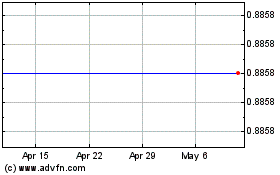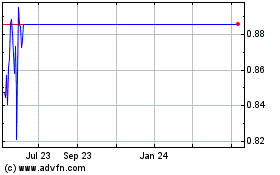Swiss Banks' Shares Slide Further After 'Brexit' Vote
June 27 2016 - 10:15AM
Dow Jones News
By John Letzing
ZURICH--Switzerland's largest banks, already reeling from the
strong franc, negative interest rates and deep strategic
restructurings, saw the U.K.'s decision to leave the European Union
send their respective share prices falling sharply again on
Monday.
The challenge presented by the U.K. vote is particularly
daunting for Credit Suisse Group AG, which is struggling to
restructure while relying heavily on investment banking businesses
that use London as an entry point to EU markets. UBS Group AG, too,
uses London as a crucial transit point for its investment bank.
J.P. Morgan analysts downgraded their ratings on Credit Suisse
and UBS on Monday, citing new pressure on the banks' profitability
as a result of the vote. European investment banks "are to be
avoided," the analysts wrote, due to uncertainty about their
ability to continue using the U.K. to "passport" into EU
markets.
A stronger Swiss franc in the wake of the vote could also hurt
the Swiss banks in particular, the analysts wrote, with every 10%
gain in the Swiss currency versus the euro shaving the equivalent
of about 5% off of each lender's earnings. The franc has risen 3%
against the euro this month and 10% against the pound.
The analysts added that the vote may also lead to a "slower
capital build" for Credit Suisse, which has drawn criticism for
maintaining a thinner capital buffer than its Swiss rival.
Shares of Credit Suisse tumbled nearly 10% on Monday at 1230 GMT
to 10.14 Swiss francs ($10.43), and touched their lowest mark at
least since 1997. The shares have lost more than half of their
value so far this year versus about 33% for the Stoxx Europe 600
Banks index. Shares of UBS fell over 7% Monday to 12.60 francs.
Exane BNP Paribas analyst Amit Goel said the impending U.K.-EU
split will hurt both Swiss banks' businesses, as uncertainty leads
to fewer deals and lower client activity. "Growth is going to be a
lot lower" than has been expected for each lender, for at least the
next year, Mr. Goel said.
A spokeswoman for Credit Suisse declined to comment Monday on
the potential impact of the U.K. vote, as did a spokesman for
UBS.
Credit Suisse Chief Executive Tidjane Thiam, who is nearing his
one-year mark at the helm of the storied bank, has sought to shift
its global operations away from relatively volatile investment
banking in favor of wealth management. But while it cuts debt
products and trading businesses, Credit Suisse still relies on
other investment bank units based largely in London.
As of earlier this month, Credit Suisse ranked second in terms
of European mergers and acquisitions advisory for the year so far,
behind Goldman Sachs Group Inc., according to Dealogic, while UBS
ranked seventh. In terms of equity underwriting in Europe, UBS
edged out Credit Suisse, according to the data, though Credit
Suisse outranked its Swiss rival in global terms.
Both UBS and Credit Suisse maintain a large physical presence in
London, to support their investment banking units and other
businesses. Both must use the city as an entry point for the EU,
because both are based outside of the EU in Switzerland.
Credit Suisse had about 6,000 employees in London as of late
last year, before it began cutting head count and subletting local
office space to reduce costs (the bank declined to provide current
head count figures). Credit Suisse had a total of 47,760 employees
as of the first quarter.
Later this year, UBS employees are expected to move into a
sleek, 700,000-square-foot office space in London. UBS had 5,430
employees in the city as of the first quarter. That is a
significant decline compared with the 6,204 workers it had in
London in 2009, when it maintained a larger investment bank--but
still a significant portion of its global head count of roughly
61,000.
UBS's new office space in the city "signals the confidence
placed in London as the world's leading financial center,"
Chancellor of the Exchequer George Osborne said in a statement
published by a co-owner of the UBS property at the groundbreaking
event in 2012.
In a statement issued last Friday, a UBS spokesman noted that
Switzerland, too, has seen a number of popular votes that have
impacted financial markets and the banks in particular.
"We are now at the start of a multiyear process" to respond to
the U.K. vote, the spokesman said, "and we will approach this in
the same way we would in our home market."
Write to John Letzing at john.letzing@wsj.com
(END) Dow Jones Newswires
June 27, 2016 10:00 ET (14:00 GMT)
Copyright (c) 2016 Dow Jones & Company, Inc.
Credit Suisse (NYSE:CS)
Historical Stock Chart
From Mar 2024 to Apr 2024

Credit Suisse (NYSE:CS)
Historical Stock Chart
From Apr 2023 to Apr 2024
